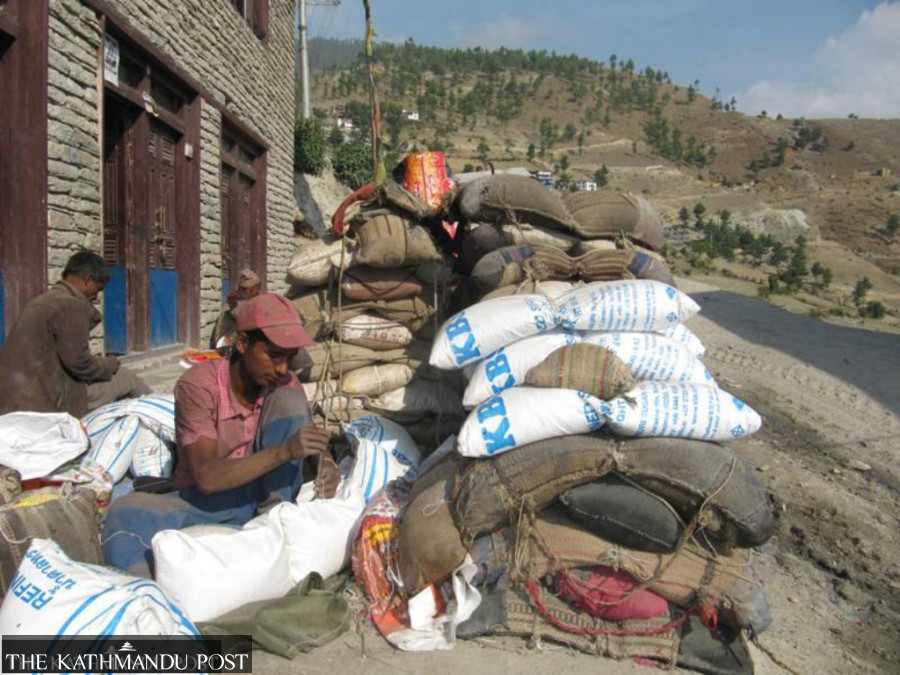National
Around 3,000 people in Saipal of Bajhang reeling under food shortage
Residents of Saipal Rural Municipality need over 4,000 quintals of rice per year, but the government has provided a subsidy for only 2,500 quintals. So far, the contractor has supplied only 1,750 quintals of rice this year.
Arjun Poudel
Manbir Bohara, chairperson of Saipal Rural Municipality of Bajhang district receives between 20 and 25 phone calls every day from villagers after they were unable to buy food from the nearby food depot.
The depot run by the Food Management and Trading Company has been shut since April 15 after it ran out of subsidised rice supplied by the government.
“Everyone asks me what they should eat, since they are unable to buy food,” Bohara told the Post over the phone from Chainpur, the district headquarters. “Since I am facing a food shortage myself, I also don’t have an answer to their question.”
Saipal Rural Municipality is the northernmost rural municipality of Bajhang adjoining China’s Tibet. It takes three days on foot to reach the office of the rural municipality from the district headquarters by the nearest road and up to four days to reach some villages.
It is among the most food-insecure rural municipalities and deprived in terms of health, education and sanitation.
Around 2,800 people in the rural municipality rely solely on the rice subsidy from the government as the food grown by them suffices only for around two months.
The government supplies rice to the rural municipality from Dhangadhi of Kailali and Bardiya.
According to Bohara, the rural municipality needs around 4,000 quintals of rice per year, but the provincial government has provided a subsidy for just 2,500 quintals. And, so far, the contractor has supplied only 1,750 quintals.
“We are in a real food shortage,” complained Bohara. “We held several meetings with the chief district officer of Bajhang, the contractor and other officials of the provincial government, but to no avail.”
People residing in remote villages of the rural municipality complained that food shortage is a perennial problem in their area. Lack of seriousness on the part of successive governments and the local administration towards the plight of the people of Saipal rural municipality and irresponsible contractors are to be blamed for the food scarcity in the villages, they added.
“How long do we have to live in constant food insecurity?” questioned Dipa Bohara, a local from Ward-5 of the rural municipality. “Today, we grown-up people ate millet pancakes, but I am unable to feed rice to my one-year-old child. He cannot eat flatbread.”
After the food depot of the village shut down, people of the rural municipality started making the rounds of their elected representatives and local leaders to pressure them to bring rice to the villages.
“Dozens of villagers including women who are in really difficult conditions come to me every day to ask if I know when the rice will arrive in the village,” said Ujjwal Bohara, a local leader of the ruling Nepali Congress. “But, I too, don’t have the answer.”
Officials at the rural municipality blamed the contractor for not supplying subsidised rice on time, which has caused a food scarcity in the villages. The contractor, however, said it’s the officials at the rural municipality who are responsible for the food shortages as they take much time to approve the rice supply process.
“Yes, I have to supply an additional 600 quintals of rice to Saipal Rural Municipality,” said Dev Raj Joshi, chairman of Jalapa Suppliers, the company, which got the contract to supply subsidised rice. “The invoices of the previous supply have just been approved, we will resume the supply of rice, once my invoice is endorsed by the regional office of the Food Management and Trading Company.”




 20.12°C Kathmandu
20.12°C Kathmandu















